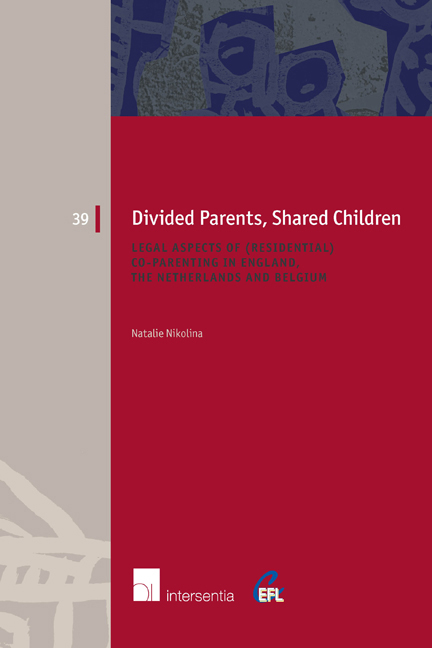 Divided Parents, Shared Children
Divided Parents, Shared Children Book contents
- Frontmatter
- Acknowledgements
- Contents
- Chapter 1 Introduction
- Chapter 2 International and European framework
- Chapter 3 The English legal system
- Chapter 4 The Dutch legal system
- Chapter 5 The Belgian legal system
- Chapter 6 Socio-psychological aspects of residential co-parenting
- Chapter 7 Comparative synthesis
- Chapter 8 Conclusions and recommendations
- References
- Samenvatting
- About the author
- European Family Law Series
Chapter 5 - The Belgian legal system
Published online by Cambridge University Press: 12 December 2017
- Frontmatter
- Acknowledgements
- Contents
- Chapter 1 Introduction
- Chapter 2 International and European framework
- Chapter 3 The English legal system
- Chapter 4 The Dutch legal system
- Chapter 5 The Belgian legal system
- Chapter 6 Socio-psychological aspects of residential co-parenting
- Chapter 7 Comparative synthesis
- Chapter 8 Conclusions and recommendations
- References
- Samenvatting
- About the author
- European Family Law Series
Summary
HISTORY OF THE MAIN LEGAL AND SOCIETAL DEVELOPMENTS
The Belgian rules on parentage, parental responsibilities and, much later, residential arrangements have been undergoing major changes from the late 1960s onwards. These changes are focused on placing the parents of both genders in an equal position and to stimulate joined care for their child, even in situations where the parents have never been or no longer constitute a couple.
Legal evolution followed and reflected the changes within society. Up until the 1970s the conservative, classic model was predominant: with the father working and the mother staying at home to care for the children and if the parents separated (which was relatively rare), the mother would usually be given sole parental authority (hoederecht) over the child or children and the father would be given contact every fortnight. From then onwards, however, many social changes occurred, such as families having less children, more women working outside the home, the growing number of people cohabiting outside of marriage, and the rise of fathers’ rights movements, alongside with the growing insight into the psychology of ‘good’ parenting. These changes led to an evaluation of the laws surrounding parental responsibilities, thereby loosening the ties between marriage and parentage.
The joint exercise of parental authority was first introduced in 1965, but only during marriage and with the father having the decisive authority in case of a dispute. Not until 1974 did the spouses gain an equal right to concurrently exercise parental authority and to make decisions on their children's upbringing during marriage. Upon separation one of the parents would be granted sole parental authority over the child. This caused much frustration among divorced fathers as it was usually the mothers who would gain sole parental authority.
The notion that parental authority was derived from marriage was replaced by parental authority being linked to (biological) parentage in 1987. However, joint parental authority in the case of separated parents was still not possible. After divorce, one parent would get parental authority over the child or children and the other would gain a right of contact.
- Type
- Chapter
- Information
- Divided Parents, Shared ChildrenLegal Aspects of (Residential) Co-Parenting in England, the Netherlands and Belgium, pp. 119 - 156Publisher: IntersentiaPrint publication year: 2015
